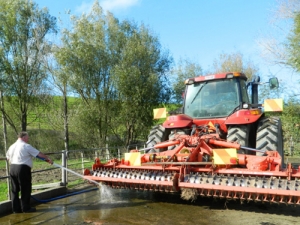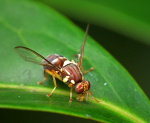The recent incursion of the invasive weed velvetleaf is a timely reminder of the importance of biosecurity and machinery hygiene practices.
This is the message from Environment Canterbury Graham Sullivan, regional manager biodiversity and biosecurity. He says rural contractors have an important role in this.
"We are urging contractors to be conscious of the potential for pest spread when moving between properties, or between areas of the same property, and to take responsibility for managing these risks," he said.
Farmers are becoming increasingly aware of the risk that pests pose to their livelihood and many are now implementing biosecurity measures at the farm gate as an "insurance policy" against the threat of new pest incursions.
"These measures include checking that contractors' vehicles, machinery and equipment are clean before being allowed on to the property," Sullivan said.
Pest plant seeds can be spread by the movement of vehicles, machinery, feed or stock. In this way, pests can spread to new areas of the same property, between neighbouring properties, or even between regions. While transitioning cattle into fodder beet crops, farmers also take the opportunity to inspect the rest of the crops.
"Implementing some simple biosecurity practices can help protect farms from the spread of unwanted pest plants such as velvetleaf," Sullivan said.
To date, the properties that velvetleaf has been found on represent only a very small fraction of the plant's potential range.
"Farmers and other professional operators in the rural sector are pulling together to help protect our agricultural sector from the spread of velvetleaf and other pests, but we all need to stay vigilant and keep up sound biosecurity practices," Graham Sullivan concluded.
Tips for contractors
Before entering a property, check with the landowner for any known pest infestations. Treat any infested areas with extra caution and plan for a thorough decontamination before leaving the infested area.
Machinery hygiene should be practised whenever a machine is moved between properties.
For farms with velvetleaf, ideally machinery wash-down should occur on the property before movement off the farm, containing any seed at source and avoiding soil containing viable seed being transported from one farm to another. See also www.mpi.govt.nz/alerts
When cleaning, there should be no remaining visible soil or plant matter
Keep a logbook to record every time your machinery is cleaned
There is a variety of ways to practise farm biosecurity and machinery hygiene. Develop practices that work for you – for example, Environment Canterbury Biosecurity staff carry mobile wash-down units on their trucks so they can clean their vehicles when travelling between properties.
For more tips visit http://ecan.govt.nz/publications/General/keepitclean.pdf











